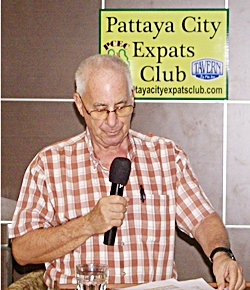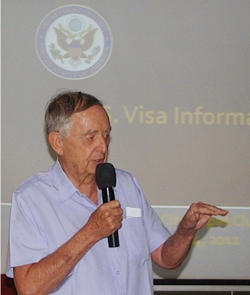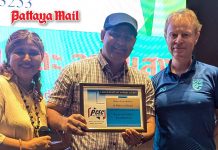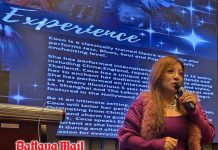Honesty is the best policy when dealing with the US Embassy to obtain a visa to visit the United States. This was the message from Tim Swanson, chief of the American Citizens Services (ACS) Unit of the US Embassy in Bangkok, at the Sunday, October 14, meeting of the Pattaya City Expats Club. Club member Gary Hacker made the introduction.
Tim started by describing the types of visas available to travel to the USA; one is the Non-Immigrant Visa for those who want to visit for a short period of time and the Immigrant Visa for those that want to immigrate to the US. The Immigrant Visa is usually sought by a relative or spouse of a US citizen. The applicant must first start the process with the US Citizenship and Immigration Services within the US Department of Homeland Security as they make the determination of eligibility. Tim said the Consular Service in Bangkok processes a few thousand of these a year. However, they process around 60,000 applications for Non-Immigrant Visas a year.
 Master of Ceremonies Richard Silverberg opens the meeting by inviting new guests to introduce themselves.
Master of Ceremonies Richard Silverberg opens the meeting by inviting new guests to introduce themselves.
Tim explained the application process and the importance of the interview with the Consular official. Tim pointed out that there is no provision for a US Citizen to sponsor someone; thus the Thai applicant is interviewed on their own. Under US Law, there is a presumption that anyone applying to visit the US actually wants to live there and will not return to their home country. Consequently, the interviewer seeks to determine that the applicant has sufficient reason to return to Thailand and not remain in the USA. Although documents are required, how the interview goes is the key. Further, he said the most important factor in the interview is for the applicant to be honest. The interviewers are very experienced and if they sense the person it not being honest, they will deny giving them a visa. If the interviewer is satisfied, they will grant the Non-Immigrant Visa, which is valid for 10 years and can be used multiple times.
Tim then talked about the ACS, explaining it is responsible for processing US passports, assisting distressed US citizens, handling matters related to deaths of US citizens, and in helping families that are trying to find an American relative that is supposed to be in Thailand. Further, the ACS acts as a gateway for citizens that are applying for social security or veterans benefits. Until recently, the ACS was not strict about making appointments for non-emergency services. However, they were brought to task about that and were instructed to enforce this requirement as other US Embassies do around the world.
Two areas that do take up a lot of his time are arrests and deaths of US citizens in Thailand. In the case of arrest, the ACS can provide a list of lawyers, but they do not pay for the lawyers. Their responsibility is to see that the US citizen is not mistreated and receives the same handling as a Thai citizen. In some cases, a Consular officer will visit the American citizen; but in outlying areas, the visit may be made by an Embassy Warden.
 PCEC Member Gary Hacker (also US warden for Pattaya) introduces Tim Swanson, Chief of American Citizens Services Unit of the US Embassy in Bangkok.
PCEC Member Gary Hacker (also US warden for Pattaya) introduces Tim Swanson, Chief of American Citizens Services Unit of the US Embassy in Bangkok.
In the case of a death of an American Citizen, they are usually notified by the Thai police.
Tim explained the various services they could provide such as notification of next of kin, acting as a conservator of the person’s property if needed, and assisting the family in making arrangements for cremation in Thailand or repatriation of the body. Again, he pointed out that the Embassy does not pay for these services which are the responsibility of the next of kin or person the deceased had previously authorized to make arrangements.
If the person has the foresight to have prepared a written document for use in case of their death, they can designate who they want to make funeral arrangements and the Embassy generally will not be involved. However, if they have not made such arrangements, then the ACS will contact the next of kin and follow their instructions.
A most interesting part of Tim’s talk was his reason for joining the Foreign Service; as a US agricultural extension officer in the Philippines in the 1990s, Tim was kidnapped by the Moro Islamic Liberation Front and held captive for 50 days on the island of Negros. Following his release, Tim felt that joining the US Foreign Service would be the best way he could serve.
You can learn more about the Club and its activities by visiting their website at www.pattayacityexpatsclub.com.
 Tim describes the services provided by ACS; as well as visas, ACS handles arrangements when a US citizen dies in Thailand, and attempts to locate US citizens who go missing in Thailand.
Tim describes the services provided by ACS; as well as visas, ACS handles arrangements when a US citizen dies in Thailand, and attempts to locate US citizens who go missing in Thailand.




